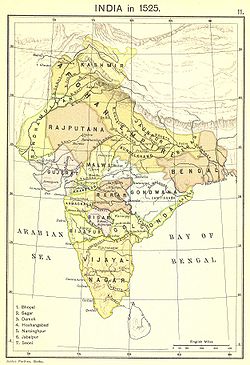Lodhi dynasty
| Lodhi dynasty | ||||||||||
|
||||||||||
|
Map showing the territory under the Lodhi dynasty, marked as Afghan Empire.
|
||||||||||
| Capital | Delhi | |||||||||
| Languages | Persian | |||||||||
| Religion | Sunni Islam | |||||||||
| Government | Monarchy | |||||||||
| History | ||||||||||
| • | Established | 1451 | ||||||||
| • | Disestablished | 1526 | ||||||||
|
||||||||||
The Lodi dynasty (or Lodhi) was a Pashtun dynasty that ruled the Delhi Sultanate from 1451 to 1526. It was the last dynasty of the Delhi Sultanate and was founded by Bahlul Khan Lodi when he replaced the Sayyid dynasty.
Bahlul Khan Lodi (r.1451–89) was the nephew and son-in-law of Malik Sultan Shah Lodi, the governor of Sirhind in (Punjab), India and succeeded him as the governor of Sirhind during the reign of Sayyid dynasty ruler Muhammad Shah (Muhammad-bin-Farid). Muhammad Shah raised him to the status of an emir. He was the most powerful of the Punjab chiefs and a vigorous leader, holding together a loose confederacy of Afghan and Turkish chiefs with his strong personality. He reduced the turbulent chiefs of the provinces to submission and infused some vigour into the government. After the last Sayyid ruler of Delhi, Ala-ud-Din Aalm Shah voluntarily abdicated in favour of him, Bahlul Khan Lodi ascended the throne of the Delhi sultanate on April 19, 1451. The most important event of his reign was the conquest of Jaunpur. Bahlul spent most of his time in fighting against the Sharqi dynasty and ultimately annexed it. He placed his eldest surviving son Barbak on the throne of Jaunpur in 1486.
Sikandar Lodi (r.1489–1517) (born Nizam Khan), the second son of Bahlul, succeeded him after his death on July 17, 1489 and took up the title Sikandar Shah. He was nominated by his father to succeed him and was crowned sultan on July 15, 1489. He founded Agra in 1504 and constructed mosques. He shifted the capital from Delhi to Agra. He abolished corn duties and patronized trade and commerce. He was a poet of repute. He composed under the pen-name of Gulruk. He was also patron of learning and ordered Sanskrit work in medicine to be translated into Persian. He curbed the individualistic tendencies of his Pashtun nobles and compelled them to submit their accounts to state audit. He was, thus, able to infuse vigor and discipline in the administration. His greatest achievement was the conquest and annexation of Bihar.
...
Wikipedia

